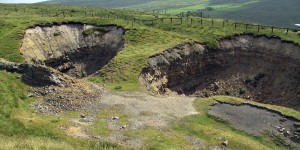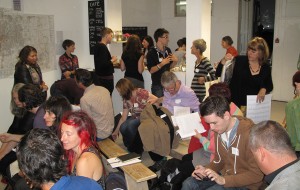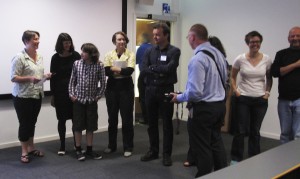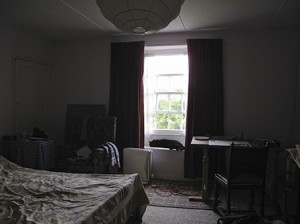Yesterday I attended an event in Aberystwyth – see http://www.cliffordmclucas.info. This was organised by Rowan O’Neill and Anwen Jones, and entitled Revisiting The Memory of Cliff McLucas. I had signed up early on, pleased to have a chance to celebrate McLucas’ work on deep mapping and acknowledge my own debt to him. Also to see friends and support Rowan who, through her PhD, has done so much to ensure that informed debate around his work continues. A few days before the event she contacted me and asked if I would act as an informal respondent to the day. “I’m thinking it would be interesting to hear your thoughts … in relation to your own deep mapping work and the inspiration you’ve previously drawn from this aspect of Cliff’s work. … it might be a nice opportunity to bring worlds together”. I agreed, perhaps without sufficiently thinking through what I was signing myself up for.
What follows here is in a sense almost an apology. Although I did speak at the end of the day, I did not say what I wanted to say about what Rowan and others have been doing, about my own debt to McLucas’ work, or about how I see the value of that work now. Apology may be too strong a word, but I have an obscure feeling that I have somehow let Cliff McLucas down and, more significantly, have let down those who value his work for its humanity and for its almost prophetic qualities. I certainly don’t feel I made the most of an ‘opportunity to bring worlds together’, in part because I’m not entirely sure that that was what many of the people at the event really wanted.
Why I feel all this is difficult to articulate, but obviously I’ll try.
First, some context. Dr Cathy Turner started the day with a sensitive, well-researched, and often poetic meditation on the McLucas archive and its resonances – both with regard to the man and to questions thrown up for us today by his work. Among these was the notion of the possibly utopian aspect of his work, which Margaret Ames picked up at the end of the session. I had intended to return to this issue at the end of the day, positing the Irish philosopher’s Richard Kearney’s notion of the productive tension between testimonial, utopian, and empathetic imagination as possibly a more useful way of thinking about Cliff’s work than one derived from the usual suspects among continental philosophers. I didn’t because by the time I was due to speak, I was unclear as to how such an issue sat with the preoccupations that had surfaced during the afternoon.
Unclear, that is, as to whether I was attending what seemed to have turned into a reunion of a generation of Welsh language and cultural activists whose heyday was the 1980s (and that just happened to include Cliff McLucas), or to celebrate the achievements of a man whose work and critical solicitude extended well beyond the specific Welsh context in which it was forged and tempered? I had been told by several people that the McLucas archive was a hot ‘political’ issue within the institution and in Wales. I was now beginning to see why.
The introductions to the new McLucas web site, to the archive in the National Library of Wales, and to MabLab where each, in their different ways, informative and thought-provoking. My own problems as respondent began with the panel in the afternoon. Let me be clear. Some of what was said by panelists was both pertinent and appropriate to a day dedicated, as I had understood it, to revisiting the memory of Cliff McLucas. But of course that phrase is itself somewhat deceptive. I had chosen to take it as emphasising the importance of McLucas’ work and how what he had achieved in the past might be carried forward. But for some others it seemed that what was most important was the act of revisiting a shared past, one in which he had played a sometimes more, sometimes (I sensed) less, important role. Much of the discussion between panel members revolved around issues of the Welsh language and relations to cultural authority – understandably given the cultural situation in Wales at that time. I’ve some familiarity with these debates – as any English person who has worked with Welsh artists and academics must be – and am by no means insensitive to the very real and longstanding problems involved or the continuing issues in a ‘post-colonial’ era. I am also deeply sympathetic to (and a little envious of) those whose language – unlike standard English – allows them to speak the land and their lived taskscape with precision and sensitivity, as Welsh clearly does.
But I have to admit that as the panel session – conducted in Welsh and simultaneously translated – went on I felt increasingly uncomfortable and, to a degree, irritated. In part this was because I could sense the growing inattention of the students in front of me as one of their elders repeated, for the third or fourth time, just how difficult the 1980s had been. But aren’t we here, I found myself thinking, precisely to enthuse those students’ generation with what had made McLucas such a valuable figure to us, rather than tell them what a tough time we had? (And, like Eddie Ladd, I think things are harder now than they were then, since the issues are more complex and far less black and white). The moment I realised I was in real trouble as a respondent came when one panel member told us he would demonstrate that McLucas was (in his words) “no saint”. It seems McLucas had told him at one point he might best solve his problems as as a Welsh-speaking English person living in Wales by simply getting out of “this fucked-up little country”. No saint indeed! I have no idea how that ‘revelation’ of McLucas’ lack of ‘saintliness’ was received by an overwhelmingly Welsh audience – there was certainly no audible sharp intake of collective breath – but, because the complexities and frustrations that revelation articulated resonated with issues that Rowan had raised about those who are hybrids within the Welsh context, the issues of context and categorisation suddenly came to seem central. Central, but also highly contentious.
What is important to me personally about Cliff McLucas, as I tried to make clear when I did speak, is that he was a man who embodied Geraldine Finn’s insight that: “we are always both more and less than the categories that name and define us”. Including, of course, the categories of nationality and linguistic ability or (in my own case) lack of it. In the self-filmed footage of Cliff explaining his deep mapping work in California, what comes over is his openness (perfectly captured in his brief remarks about his music tastes); his desire to share and involve; his concern that his work should serve the needs of others. And it was very clear from at least two speakers that he was, as a result, an outstanding mentor.
Any of us with some professional awareness of his lifework already knew of his extraordinary breadth of vision and his practical ability, in many registers, to get that vision out into the world. So for me it was the insights into his more personal qualities, his ability to hold at one and the same time an imaginative sense of “the smell on a man’s breath” and the historical and conceptual “strangeness” of his ideas, that struck me – and, as part and parcel of that, his openness, his capability as a mentor. That, for me, was what was most valuable in the day.
So why didn’t I say all this as a respondent. One answer is that I could see no way of doing so adequately without giving offence. To put it bluntly, we all now live in “fucked-up” countries – their size is largely irrelevant – as a result of weight of global capitalism, impending ecological meltdown, and the internalisation of the culture of possessive individualism upon which capitalism depends psycho-socially. The nostalgia (as I see it) of many of the panel for a world in which the Welsh language could be taken as the central issue for their community seemed to me almost counter to everything I admire about Cliff McLucas. I am sure he had his failings, but nostalgia, parochialism, and the particular self-regard of artist/activists that so neatly models possessive individualism for the advertising industry were clearly not among them. Anyway, mindful of being a guest in Wales and at an institution in which its language is central – both facts reinforced by the bi-lingual nature of the event – I felt unable even to appear to question the terms on which that hospitality had been extended. However, and this is the crux of my own discomfort, I also think that there was something cowardly in my reducing all the above responses to the day to the brief generalisations that I ended up presenting.
A second answer is that I would liked to have said that we genuinely only re-member the dead by incorporating what was best in their lives into our own values, practices and understanding. That’s a big ask, because it means that we have to have the humility and generosity to make space within ourselves in order for them to have a place there. For me that’s what the transmission of culture in its best sense is about. That’s a hard thing to say to a room full of people (most of them strangers) at the best of times, particularly since I’m aware that it can all too easily be interpreted as some kind of personal rebuke.
So what do I think is Cliff McLucas’ value to the C21st? On yesterday’s showing I’m not sure I’m qualified to answer that question on behalf of any constituency other than myself. However, in my personal view he is a key figure in that – through his exploration of notions of deep mapping – he provides us with an orientation from which to rethink issues of connectivity. By this I mean the dynamic, complex, and unstable web of relationships between humans, non-humans, and the particular spaces and places they inhabit and engage with on a daily basis. Such inhabitation and engagement occurs in a multi-dimensional mesh of physical, psycho-social and non-human geographies that extend well beyond any particular cartographic site, region or even nation. They take, and make, place in a polyverse that is tensioned somewhere between Doreen Massey’s understanding of space as “a simultaneity of stories-so-far” and Tim Ingold’s notion of a ‘meshscape’. More particularly, and in terms of my own interests, he offers an alternative way of engaging with the ‘placing’ of marginal rural communities that’s capable of generating the the critical solicitude necessary to engage with the dynamic psycho-social tensions engendered by their marginality. This, as I see it, is informed by a version of Kenneth Frampton’s Critical Regionalism as re-calibrated through Felix Guattari’s ecosophy. Two tensions are central here. One is between the rural as ‘landscape’ – fundamentally an ‘aesthetic’ presupposition in which land is always seen at a distance and from an ‘edge’, looking inwards – and the other as a working ‘taskscape’ in Tim Ingold’s sense. One experienced from the position of a moving and unstable position within that taskscape. The other tension is between a pragmatic commitment to communitarianism and the dominant culture of ‘possessive individualism’.
Cliff McLucas remains central to my interest, and in my view a globally important figure, to the degree to which working through these tensions might help us re-frame more extensive socio-environmental issues.



